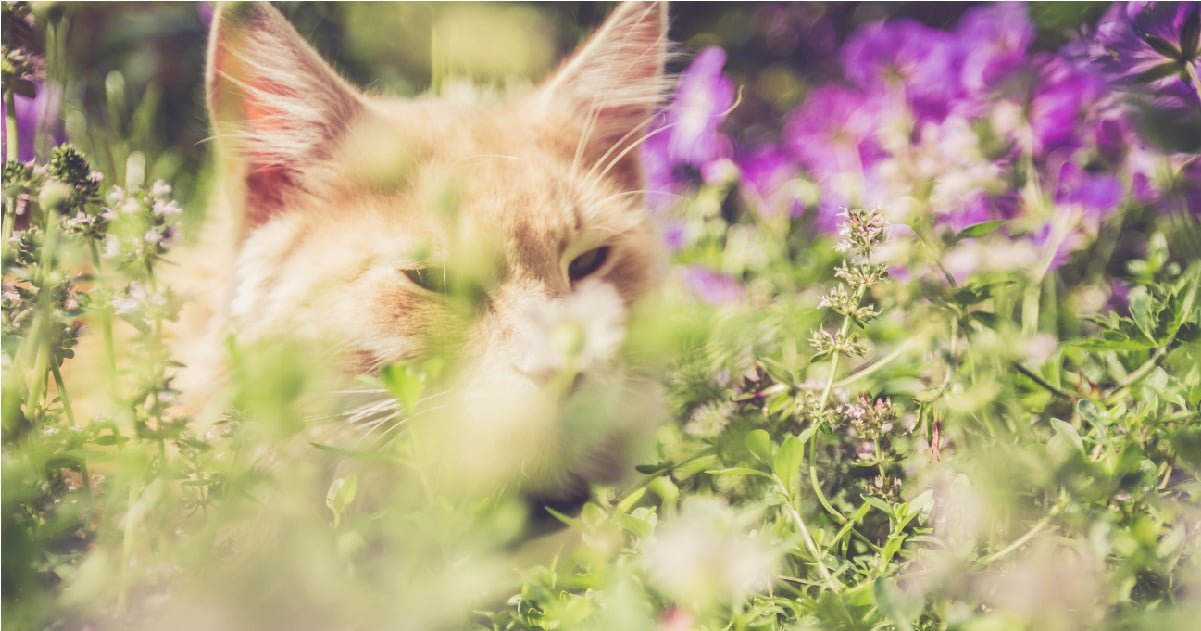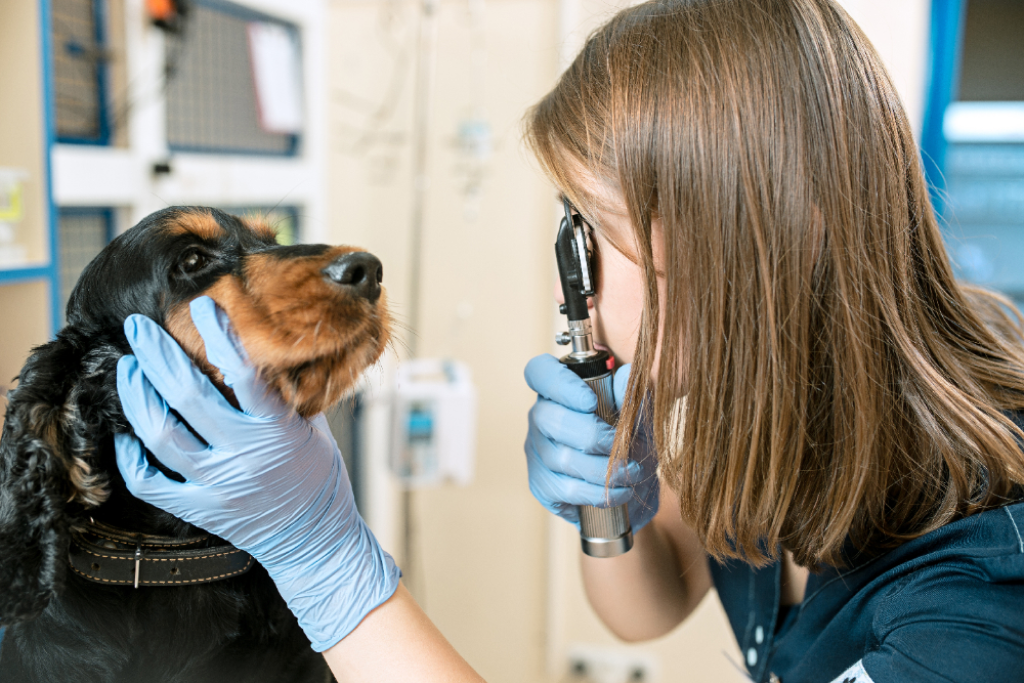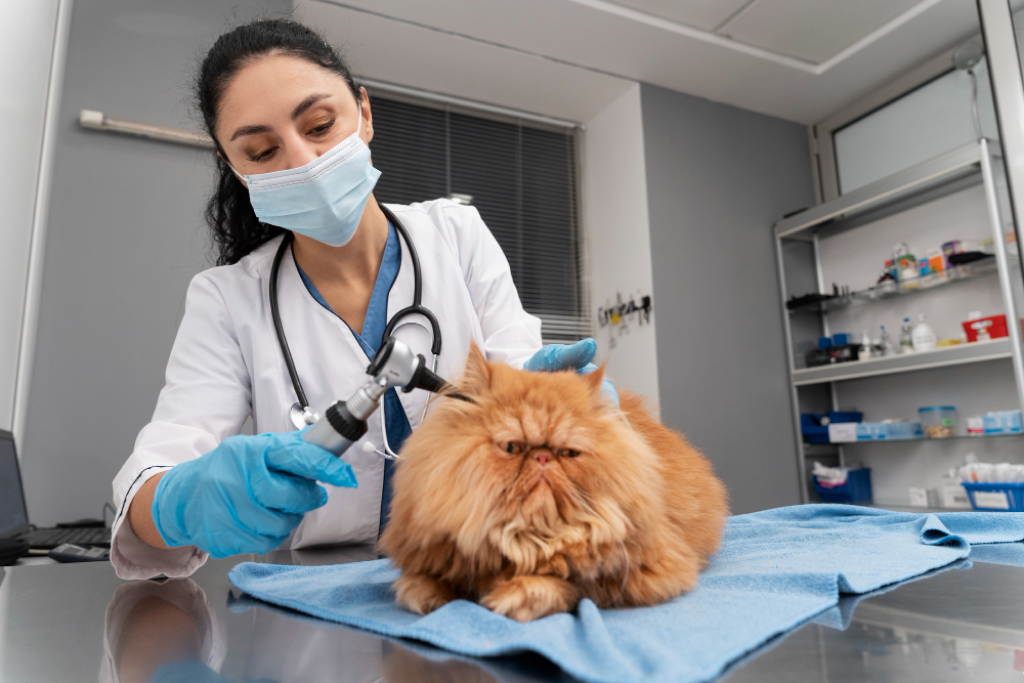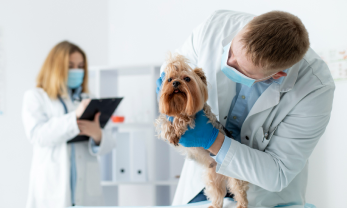A common question asked by cat owners in the summer
Rising temperatures, sunny weather and longer days bring happiness for many after the long British winter, but for those with hay fever, it can be something to dread. Warmer dry weather brings an increase in the pollen count and can hamper the enjoyment of the great outdoors for some, but can cats get hay fever too?
Unfortunately, the answer to that question is yes. Our feline friends are no exception when it comes to hay fever and they can often become irritated by high pollen counts.
However, cats often display different symptoms to humans, meaning that your cat may be suffering from allergies without you recognising the symptoms as being hay fever. In this blog, we will explore what causes hay fever in cats, what symptoms you should look out for and what you can do to help your cat who is suffering from hay fever.
Dermatology advice from your local vets
We’ve put together this resource to help you spot the signs of hay fever in cats. If you notice your pet is suffering from allergies of any kind, book an appointment at Knutsford Vets Surgery to discuss their symptoms.
Contents
Click on the section that is most relevant to navigate to that part on the page.
- What causes hay fever in cats?
- What are the symptoms of hay fever in cats?
- How can hay fever in cats be treated and prevented?
- What else could be causing hay fever-like symptoms in a cat?
What causes hay fever in cats?
Hay fever is a seasonal allergy that normally only happens at certain times of the year when plants and grass are releasing pollen into the air. Just like when a human has hay fever, your affected cat’s immune system reacts to pollen like a foreign invader, and as the cat’s body tries to get rid of the offending substance they might show all kinds of symptoms.
There are different hay fever seasons depending on the type of pollen – for example tree pollen typically occurs from March to mid-May, whilst grass pollen covers from around mid-May until July.
Symptoms of hay fever are different in cats when compared to humans. Our team are on hand to offer your advice and treatment.
Holly Cooper, Head Veterinary Nurse
Runny eyes, wheezing and excessive itching are all tell tale signs of hay fever in cats.
If your cat is affected by these symptoms in the summer months, book an appointment today.
What are the symptoms of hay fever in cats?
Hay fever in cats affects their skin more than it does their sinuses, and it can make them chronically ill and feel quite unwell. Some of the main signs that you should look out for include:
- Excessive scratching that goes beyond the normal level of grooming you would expect your cat to undertake. Allergic reactions to pollen can make their skin, ears and bottom very irritable and itchy
- Sores and bald patches in the fur – allergies may cause your cat to itch constantly, which can in itself cause baldness, or alternatively the allergy may directly cause their hair to fall out. Read more about bald patches in cats.
- Snoring – you may notice your cat making a snoring sound similar to the noise some humans make. This is caused by an inflamed throat and is another sign that your cat may be suffering from hay fever
- Itchy and runny eyes – pay attention to your cats eyes to see if there is any kind of discharge that would indicate irritation
- Sensitive paws – if your cat is suffering from this symptom they may chew at their paws, so you should look out for this abnormal behaviour in your cat
- Sneezing, wheezing and coughing – these symptoms will be particularly prevalent if your cat also has asthma. If your cat has not been diagnosed with asthma and displays these symptoms, you should bring them to the surgery so our vets can establish the cause.
How can hay fever in cats be treated and prevented?
If your cat displays any of the symptoms above, you should book an appointment at the surgery so that our vets can provide a diagnosis and subsequent treatment. Some of the symptoms can also indicate other health problems so your vet will rule these out before deciding on an appropriate treatment. Some of the ways that hay fever can be relieved and treated in cats includes:
- Daily antihistamines – these can reduce your cats reaction to pollen in the long term, and are most effective when used preventatively before your cat is exposed to the allergen
- Cortisone, steroids or allergy injections for airborne pollens – these will help to get symptoms under control if your cat’s allergies are really bad
- Bathing – giving your cat a bath once or twice a week will be useful in removing pollen from their coat, thus relieving itching. Speak to your vet for recommendations on what shampoo you should use.
It is important that you don’t try any home remedies before checking with your vet, as you could make the problem worse. Medication also requires a prescription so it is vital that you bring your cat to the surgery so that we can ensure they receive the treatment they require.
Of course, in an ideal world prevention is better than cure, though unfortunately it is often not possible to completely remove pollen from a cat’s environment. Keeping your cat inside when there is a high pollen count will of course help to avoid onset of symptoms, though this is easier said than done, particularly with those adventurous felines!
However, you can help reduce the amount of pollen in the cat’s indoor environment by vacuuming and dusting on a regular basis, including regularly cleaning their beds and toys. Brushing your cat can also help to remove pollen from their coat, so try to do this at least once a day.
What else could be causing hay fever-like symptoms in a cat?
Some of the symptoms of hay fever in cats are also commonly associated with fleas, so you should rule this out before bringing them to the surgery for allergy advice. Check your cat’s coat for flea droppings, and make sure that your cat is up-to-date with monthly flea treatments.
There are also many other allergens that could be responsible for your cat’s symptoms.
Cat allergies can be divided into 3 main categories – flea allergy, environmental allergy and food allergy. If your cat’s symptoms are seasonal (worse in the summer and better during the winter) then it is most likely at least partly due to pollen. On the other hand, if your cat has symptoms all year round or out of pollen season, then they are probably being affected by another kind of allergy.
Cat’s often have multiple allergies, so bringing your cat to the surgery for a thorough examination is recommended. Our team here at Knutsford Vets can perform tests, including allergy testing to see whether your cat is reacting to pollen or something else, such as certain food or cleaning products.








